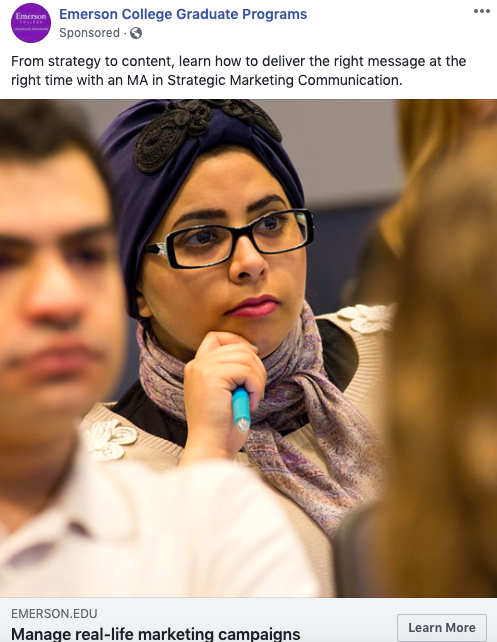I love learning, and recently, I’ve been pondering taking an online course or two at a local college, just to sharpen my marketing and communications skills.
When I started doing some research, like typing in local colleges and looking at courses, I took a break periodically to check social media.
Surprisingly, as I was perusing Facebook, I noticed I had a brand new Reach Ad on my news feed:
I knew this was a Reach Ad by the way it’s designed. The copy is short, but it provides actionable language and was shown to me as a response to my recent search queries.
Ultimately, the ad is incredibly effective. My high-intent while searching for education courses in my area makes me an ideal candidate to receive this sort of message. After seeing the ad, I immediately clicked the “Learn more” CTA.
This is an example of Facebook’s Local Awareness Ads. Here, let’s explore what Local Awareness Ads are, and how you can use them to take your marketing strategy to the next level.
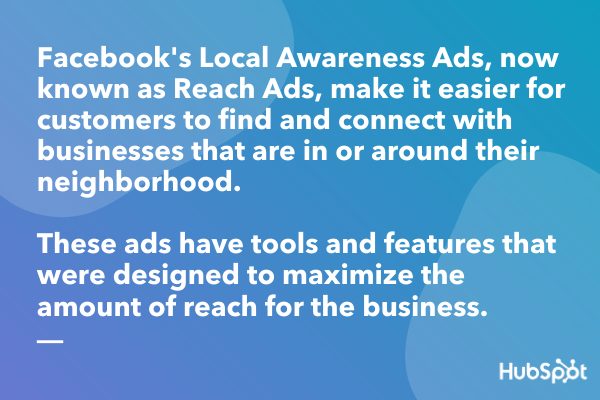
You can use Reach Ads to let customers know about a promotion or upcoming sale, giving audiences an incentive to visit your website. Reach Ads can also build interest in a time-sensitive event, such as a happy hour or special offer, and make the content shareable.
Reach Ads are also helpful for building your brand’s ties to the community. An ad can be created to share your business’s origins and how your company is connected to the area.
Let’s talk about some of the features that make these outcomes possible.
One spectacular ad feature is the four different types of call-to-action buttons, each with their own purpose:
- Get directions — This CTA button help users find your business from their device. If you want to increase foot traffic to your business, this is the button for you.
- Call now — In general, think of this as your “build customer relationships” button. A customer can tap on this button to call your business, helping you facilitate sales conversations.
- Send message — When users click this button, they can send a direct message to your business, so this CTA is a great way to increase leads.
- Learn more — If raising webpage traffic is one of your biggest goals, this CTA button will send users directly to your website in order to learn more information.
These CTA options are one of the ways Reach Ads helps with exposure. When developers at Facebook talked with advertisers, they learned that the number one driver for in-store traffic is reach, which became the developers’ focus when building the ad tool. Advertisers can select locations for their ads instead of specific users, to respect the users’ privacy.
When advertisers select audiences, Facebook doesn’t note how many people are in an audience, and users will only see ads if location services are enabled on their device because that’s how Facebook tracks a location.
Now that you know about Reach Ads, and how they can help you out, let’s explore some tips to make your ads shine in your users’ news feeds.
Tips for local awareness ads.
Every local business has a story to tell. In order to help businesses share that story to the correct audience, Facebook created Reach Ads. Here are a few ideas you can use to make sure your ads have the biggest impact.
1. Follow Facebook’s Recommendations For Reach Ads.
When you’re formatting your ad, pay attention to the structure. Does it fit Facebook’s recommended optimization ratios?
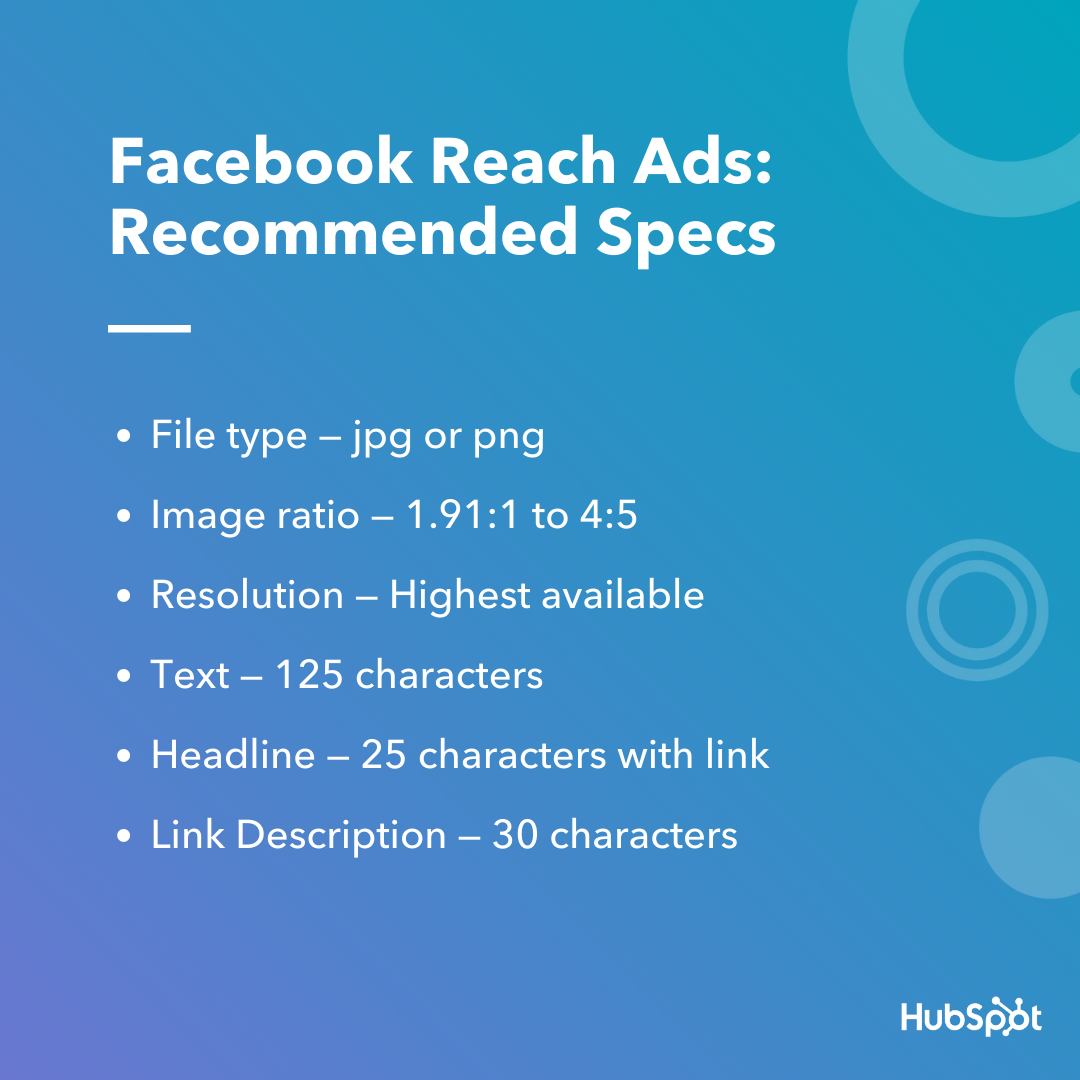
If, after you create your ad, you notice you have 130 characters for ad text or a 25 character description, don’t sweat it. Those characters are flexible, but make sure your image size is always the highest resolution available, so your media element is visually pleasing to customers.
2. Use Reach Ads To Increase Brand Awareness.
The marketers at Canadian communications company, Rogers Communication, wanted to increase awareness of its new data plan by connecting with family-oriented audiences on Facebook.
One of their methods included using the “Learn More” CTA button (remember, this button is great for building customer traffic) on their ad. This encourages prospective customers to call and visit the website to learn more about the plan.
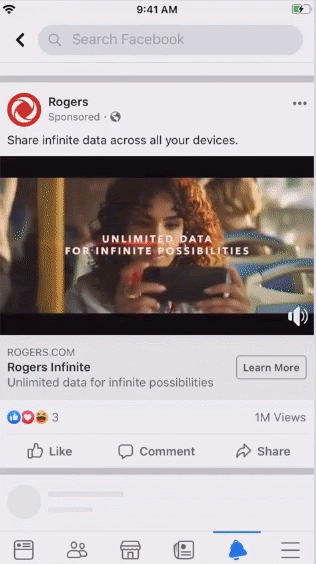
After using Reach Ads to connect with their target audience, the campaign reached 65% of their total audience, as well as a six-point lift in intent to purchase. The ads were fast-paced videos that showcased the advantages of an unlimited data plan, like the one Rogers was offering, and connected with their audience.
3. Use Facebook Retargeting To Engage Visitors.
When you use Facebook retargeting for ads, you are using a tool that encourages visitors who leave your site before converting to stay a little longer. The way this happens is by showing them a personalized ad to introduce the conversion opportunity.
In general, using a Facebook retargeting campaign lets you remind potential customers about your business.
I recently browsed some products at a few clothing and beauty stores. When looking at my sponsored content on my Facebook news feed, I can see which businesses’s decision-makers have chosen a retargeted campaign:
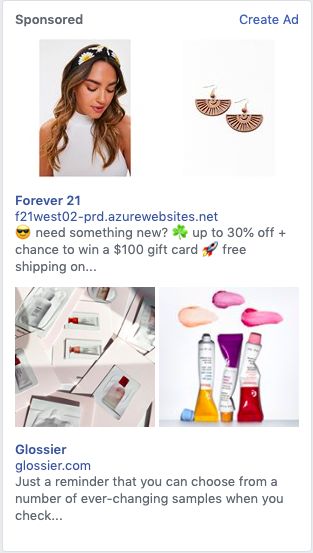
I added products to my cart from both of these stores, and based on my Facebook searches, these are the retargeted ads Facebook is choosing to show me.
These dynamic ads engage with leads who have interacted with your brand already, such as email subscribers or previous customers. These leads already know about your brand, so they’re closer to conversion than customers who haven’t interacted with your brand yet.
Engaging visitors with a retargeting ad boosts the effectiveness of your Reach Ads, personalizing the customer journey for leads with a further step.
4. Include Reach Ads In Your Sales Strategy.
Reach Ads can drive sales.
For instance, when the marketers at lifestyle magazine Essence began planning a campaign that would boost ticket sales to their festival, Essence Fest, they decided to use Reach Ads, and found phenomenal success by doing so.
Essence’s team found that Facebook’s ad options provided the necessary solutions they needed to make a dynamic campaign with creative elements that helped them exceed their ticket sale goal.
The campaign used videos, slideshows, and retargeting for their campaign. A video from this campaign showed Facebook users past performers, the festival’s message, and included a CTA to get customers to buy tickets.
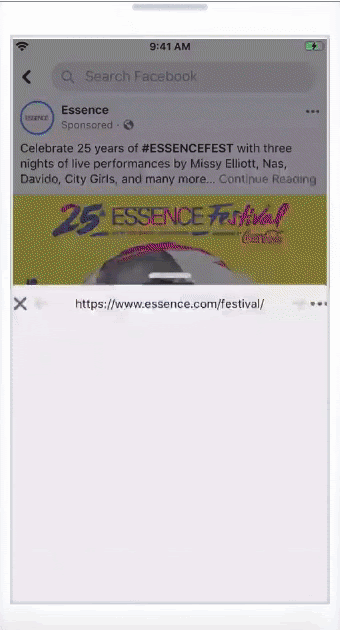
Source
Since this was Essence’s first time using a strategy as expansive as this one, they were very interested to see the results of their campaign. After two months, the campaign earned Essence 1,600 ticket sales from Facebook ads.
You can use Reach Ads to drive in-store sales by using the “Get Directions” or “Learn More” CTA buttons and changing up the language in a current ad to encourage more action to purchase.
5. Encourage Customer Attendance At Your Store.
Home furniture retailer Pier 1 used Reach Ads as part of a marketing campaign to increase foot traffic at physical locations. The goal was to gain more visitors over the winter holidays using a mix of video and photo ads.
When decision-makers at Pier 1 saw that brand loyalty was dropping, they decided to use the winter holidays to launch a campaign on Facebook to get more people in stores. As a result, the campaign used copy that invoked action.
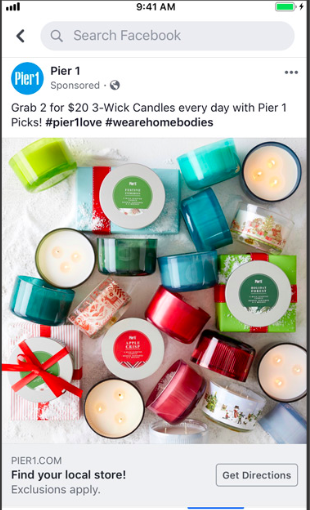
Source
Notice how the ad makes use of the “Get Directions” CTA button, reinforcing easy options for potential visitors to find their way to a store.
From a carousel ad that showed new collections, an emphasis on current sales and the Pier 1 brand, the company’s dynamic campaign, running from November—December 2018, earned a 5% increase in in-store traffic.
6. Analyze Reach Ad Performance To Measure ROI.
Tracking the performance of ads is an essential step in running a campaign. Ad insights lets you know if your ad was profitable and successful. The key metrics of an ad’s campaign gives you an idea of how to make improvements for more effective ads.
Facebook has an Ads Manager that provides insights and metrics about all of your ads, including all of your Reach Ads. You can track the exposure your ad is getting and how frequently people are seeing your ad.
To illustrate these tools, here is a screenshot from Ads Manager showing the amount of money being spent on an ad by the account holder. The next tab will show how many audience members are being reached with that ad spend.
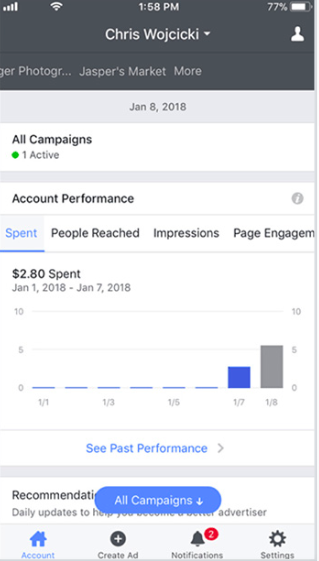
Source
Ads Manager also shows you ROI data in the form of cost per 1,000 users reached. This metric will show you the costs of current campaigns compared to previous ones, and provides metrics to help you maximize ad spend.
Last but not least, Facebook’s Ad Manager shows you button clicks at the end of your campaign. Button clicks will tell you how many people interacted with your CTAs. If you test out different buttons for different Reach Ads, you can infer which types of buttons are more successful and keep those in future campaigns.
Even though Reach Ads have been re-named to better explain their purpose, they’re synonymous with the concept of local awareness. They are a cost-effective way to spread the story of your business without traditional advertising channels, like newspapers. The precise capabilities of Facebook’s Reach Ads improve the number of customers who are more likely to interact with your business.
REF:HUBSPOT![]()
